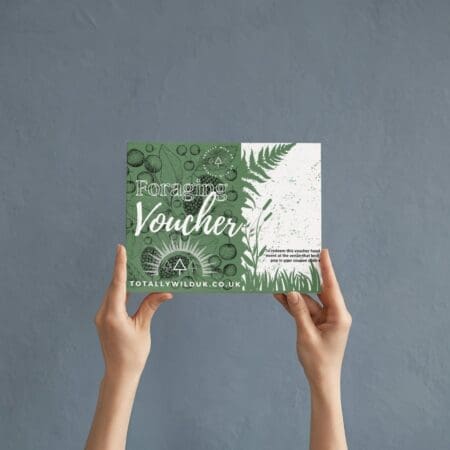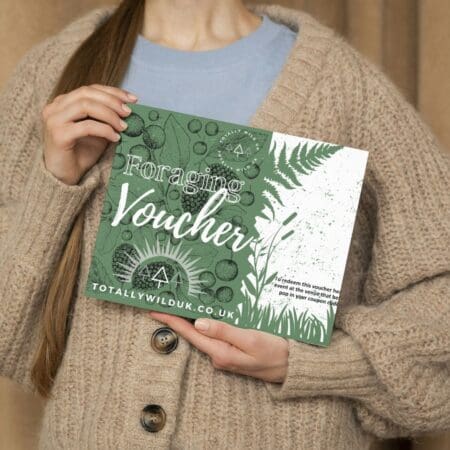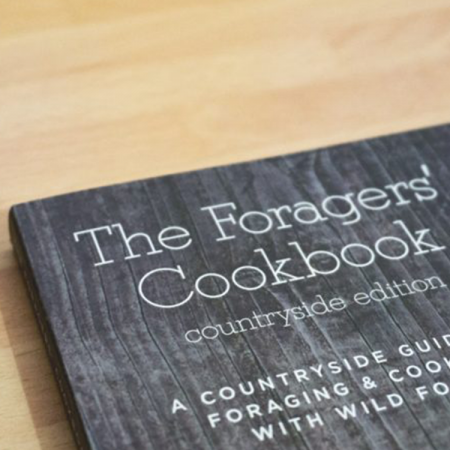Much as foraging has had a bit of a moment in the last few years and is gaining more attention and popularity, many if not most people have never eaten any wild food before & I wondered why don’t people forage. In this article I want to explore some of the reasons for this and some of the ways to break down those barriers.
I don’t want to poison myself!
This is by far the most common reason we hear, and a perfectly reasonable concern! There are plenty of poisonous plants and fungi out there after all – but there are far more totally harmless ones. All you need is a little knowledge – and not to suddenly get all blasé about making mistakes. In fact this caution in the back of your mind will actually make you a better and safer forager – We have a bit of a mantra in the foraging community: If in doubt, leave it out. Even if you are 99% sure you know what’s in front of you, if that 1% doubt will keep you awake with worry just don’t eat it, save yourself the angst. You don’t have to eat anything at all unless you are completely confident in your ID – and it’s fine to take your time learning until you feel confident, and to start with some really easy species that don’t have any poisonous lookalikes.
I just don’t know where to start
We can help you out there – browse our website for ID guides, and to see if you can book on a course – there’s really no substitute for seeing these plants and fungi in the wild and being able to touch and smell them under the supervision of an experienced forager. It’s also crucial to get your hands on some good ID books to refer back to. Rather than drop a whole lot of cash at once, you might want to borrow a few from the library first to see which ones work with your learning style.

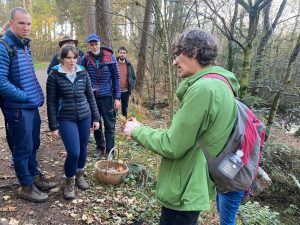
DON’T just rely on random tiktoks or other social media – there are lots of great foragers making good well researched content, but there are also loads of… shall we say… less well informed? content creators posting things that are inaccurate and sometimes outright dangerous! We’ve seen some absolute howlers out there so always check what you see on social media against reputable websites and books
Is foraging even legal? I don’t want to get into trouble
Foraging IS legal, with some caveats. Have a read of Fezs article for more details, but the basic thing is not to trespass, not to pick on any nature reserves or protected site, not to pick any endangered species and basically just be respectful of your environment.
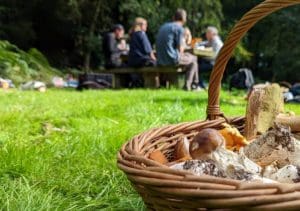
I don’t like the idea of eating something I just found on the ground – what about hygiene?
Some people worry that wild food is dirty – but we would reply that its no more so than anything else that grows in the soil – and a little bit of dirt can be good for you , anyway! What if something has peed on it? Is a question we get asked on courses all the time. The answer is pretty common sense – I would always pick away from paths a few metres back out of the ‘dog zone’ and I’ll leave anything that looks obviously dirty. Also, apologies if this grosses you out, but bear in mind that most of the veg you eat grows out in a field somewhere, and anything could pee on it there too! If you just practice good food hygiene and wash everything and cook it thoroughly just the same as you would with any fruit or veg, you should be completely fine. Inform yourself how to avoid botulism if preserving things, and water- borne parasites if picking near water.
Access to green spaces – where can I go?
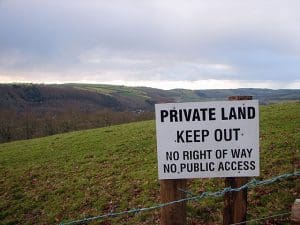
Another barrier to getting started is inequality of access to green spaces to practice in. Many studies document how availability and affordability of transport can really hinder people on low incomes from exploring outside their local area. Its not just an Urban problem – rural poverty is also a thing, and public transport options are usually even worse out there, so even people who already live in the countryside can have trouble getting around to forage in different habitats. These are real structural problems that need big change – but while we chip away at that, what you can do is start from where you are, and tune in to the botany and mycological possibilities of your local area. You don’t have to go way out of your comfort zone or travel out into unfamiliar or unaffordable places to get started – there are loads of edible plants that grow as ‘weeds’ in parks and gardens, hedgerows and roadsides, even up through the cracks in the pavement, so even if you live in a really built up place there will be urban foraging opportunities within walking distance
Cultural reasons
By culture I mean both big picture stuff and also the culture of you as an individual, the ideas about food, wild spaces and the environment that you have picked up from your family, friends, peers, school and media as you’ve grown up. One example of big picture stuff is in how different societies view mushrooms and fungi in general. Some cultures such as France, Italy and large parts of Eastern Europe are broadly mycophilic societies – Its normal to think of wild mushrooms as good food and fairly ordinary pastime to go out foraging for them, and people are more likely to have learned a few good edible species from their family as they grew up. On the other hand, the UK is in general quite a mycophobic society. This means there are a lot of cultural myths associating fungi with danger, bad luck, and general ickiness. Many of us have been told as children that all wild fungi are poisonous (not true!) or to avoid all wild mushrooms to be on the safe side. If you come from a mycophobic cultural background, it might take some time to unlearn that fear and get comfortable looking at wild mushrooms as good food!
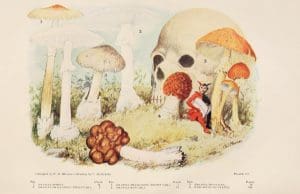
Another UK factor is how urban our population is, and has been for a few hundred years and many generations of families, since the Industrial Revolution moved a large chunk of working people from the country to the city. Those country-dwellers probably all knew at least a few edible and medicinal plants and would recognise different species that they saw around them all the time. But changing environment and working long hours in crowded cities without easy access to green space quickly severed that familiarity, and made it harder for children to learn from their parents. So for many families it’s been generations since this knowledge was part of everyday life. People who have arrived in the UK more recently might potentially have great plant knowledge from back home but not yet be familiar with the local species, so might rightly be cautious about making mistakes. Like I said earlier that caution is a pretty good trait in a forager and helps keep you safe, but it would be a shame to let it put you off completely. At least if you already are used to being around plants and looking for their particular ID features, you have a head start in practical botany terms! ‘False friends’ can be really tricky if you’re foraging in a new country or continent – don’t make the same mistakes some Europeans make in North America, when they pick a toxic False Parasol (native to North America but very rare in Europe) because it superficially looks like the delicious and familiar Parasol mushrooms that we think of as an easy beginner species here. Different places have different species to get to know – but if you make sure your ID books are specific enough to the place you are foraging and if in doubt consult a local expert, you should be OK.
Finally, its a very individual thing based on loads of different factors and life experiences, but its been pretty well documented that some people from ethnic minorities may just not feel as comfortable in the countryside, which much as its understandable is a crying shame and needs to change. Plenty of other writers are more qualified than me to talk about how this feels and what can be done about it. But all I can say is that foraging for food is older than humanity itself, so of course it should be for everyone! Foraging is a great way to connect to the land and be part of the ecosystem – so just maybe, for some, it could be a gateway to feeling more empowered and confident outdoors.
So in conclusion, there are lots of different reasons why somebody might not have ever foraged before or might be hesitant to start now. And some of those reasons are pretty valid, so don’t throw the baby out with the bath water – keeping a little caution in your mind about both your ID skills and being aware of your wider environment will keep you safe. But I really hope that both as individuals, and as a community of people who are interested in wild food, we can bring down some of those barriers to entry and make foraging knowledge (and the health and happiness benefits that go along with it) accessible to everyone.
Be safe wherever you go, but know that whoever you are you have every moral and legal right to gain and to use this knowledge – and to get excitement and joy from getting outside, getting a deeper understanding of your environment, and getting some delicious food while you’re at it.



